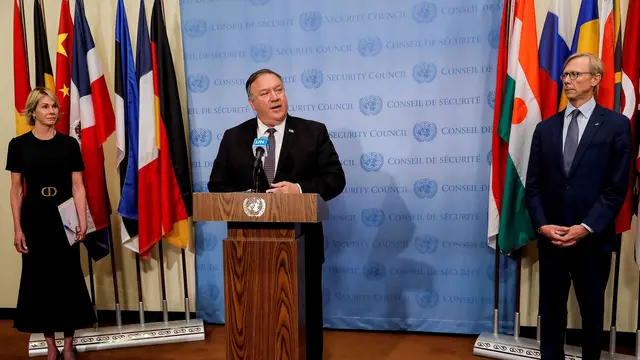The United States formally began the process Thursday of activating a controversial mechanism aimed at reimposing sanctions on Iran, a move that was immediately rejected by its European allies fighting to save the Iranian nuclear deal.
U.S. Secretary of State Mike Pompeo accused Britain, France and Germany of "siding with the ayatollahs" after they insisted Washington had no legal right to trigger the disputed procedure called "snapback."
The U.S. will do everything it can to enforce UN sanctions on Iran if they are violated, Pompeo said following the U.S. move to restore all UN sanctions on Iran.
He told reporters at the UN it would be an "enormous mistake" not to extend the arms embargo on Iran, adding the U.S. will never allow Iran to freely buy and sell conventional weapons such as tanks.
Pompeo personally submitted a letter to the president of the UN Security Council and Secretary-General Antonio Guterres in New York, accusing Iran of "significant" non-compliance with the terms of the 2015 historic accord, according to a copy seen by AFP.
It is intended to launch the start of the process to snapback sanctions on Iran that threatens to torpedo the historic 2015 nuclear accord and threatens to plunge the Security Council into crisis.
It also widens the gulf between the U.S. and almost every other Security Council member on Iran policy, which began when U.S. President Donald Trump withdrew from the nuclear agreement in 2018.
The procedure, never before used, comes after the U.S. suffered a humiliating defeat at the Security Council last week when it failed to muster support for a resolution to extend a conventional arms embargo on Iran.
The snapback aims to restore all international sanctions against Iran that were lifted as part of the nuclear agreement with Tehran in exchange for it agreeing not to develop nuclear weapons.
But it also threatens to sink that historic deal, known officially as the Joint Comprehensive Plan of Action (JCPOA), which other signatories Britain, France, Germany, Russia and China are trying to save.
Britain, France and Germany released a joint statement saying they would not support the action "which is incompatible" with efforts to preserve the JCPOA.
"We call on all UNSC members to refrain from any action that would only deepen divisions in the Security Council or that would have serious adverse consequences on its work," they said.
Pompeo accused them of a "failure of leadership" and said their actions would "endanger" people living in the Middle East and their own citizens as well.
'Lasting damage'
The European trio says it has serious concerns about the conventional arms embargo expiring on October 18 but believe the safest way to keep Iran in check is through the JCPOA.
The snapback procedure is supposed to lead to the re-establishment of sanctions after 30 days, without the possibility of any members, namely Russia and China, wielding their vetoes.
Pompeo insists that America can trigger a snapback because it was a participant when the deal was signed and insisted it would successfully lead to the automatic renewal of sanctions in 30 days and an extension of the arms embargo.
Experts say the snapback attempt raises questions about the legitimacy of its resolutions.
They foresee a situation in which the U.S. acts as if the sanctions have been reimposed – and the rest of the Councilcontinues as before.
"There's no doubt the Trump White House is using snapback as a desperate last gambit to burn the JCPOA house down before the U.S. elections,"Ellie Geranmayeh, an Iran expert at the European Council on Foreign Relations, told AFP.
"This move will leave the UN Security Council in one big mess, with competing narratives among world powers over if the UN sanctions against Iran should be reinforced," she said.
"What it does do is leave a lasting damage for the UN Security Council and further isolates the U.S. position on Iran."
(AFP)
 简体中文
简体中文

